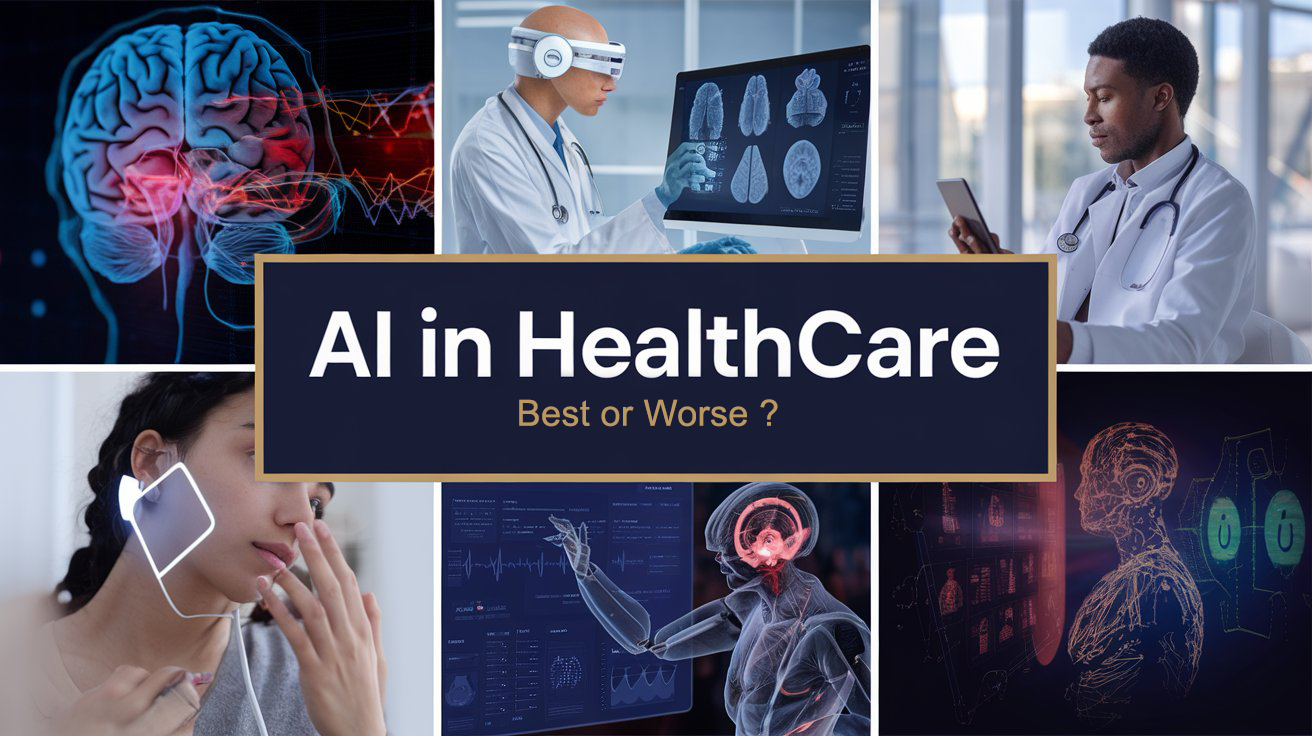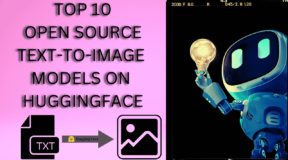Artificial Intelligence(AI) in Health Care
Artificial Intelligence (AI) is significantly transforming healthcare by enhancing diagnostic accuracy, optimizing treatment protocols, and improving patient outcomes. From its early conceptualization to the sophisticated algorithms today, AI’s integration into healthcare has followed a path of rapid evolution and pivotal technological advancements. The scope of AI applications in health is vast, ranging from predictive diagnostics to personalized medicine and beyond.
AI in Medical Diagnostics:

- AI in Imaging and Pathology: Modern AI technologies enhance the resolution and accuracy of imaging techniques like MRIs, CT scans, and X-rays. These tools help identify subtle patterns that may indicate early signs of diseases such as cancer.
- Genetic Testing and Liquid Biopsies: AI-driven genetic testing provides insights into individual genetic profiles, helping predict disease risks. Similarly, AI analyses of liquid biopsies can detect trace amounts of cancer DNA in the blood, facilitating early cancer detection.
- Case Studies: Numerous case studies highlight the precision of AI in identifying early-stage cancers, significantly improving survival rates by facilitating timely treatment.
AI in Treatment Planning and Personalized Medicine

- Personalized Treatment Plans: AI analyzes vast arrays of patient data to tailor treatment plans that are optimized for individual health conditions and genetic makeup.
- Robotic Surgery and Radiation Therapy: Integration of AI with robotic systems enhances surgical precision and effectiveness, reducing recovery times and improving patient outcomes.
- Pharmacogenomics: AI’s role in pharmacogenomics involves analyzing how genes affect a person’s response to drugs, thus enabling personalized drug therapies.
AI in Patient Monitoring and Care:

- Wearables and IoT: AI-powered wearable devices and IoT applications continuously monitor health metrics such as heart rate and blood glucose levels in real time, offering timely insights into patient health and predicting potential health issues.
- Critical Care: In critical care settings, AI systems provide real-time decision-making support to manage complex cases and emergencies.
- Chronic Disease and Remote Monitoring: AI tools play a crucial role in managing chronic diseases by monitoring patients remotely, thus reducing the need for frequent hospital visits and allowing timely medical interventions.
AI in Mental Health:

- Diagnostic and Treatment Tools: AI algorithms assist in diagnosing mental health conditions by analyzing speech patterns and writing. They also aid in delivering cognitive behavioral therapy online.
- Virtual Therapists: AI-driven virtual therapists provide consistent support and counseling, making mental health care more accessible.
- Monitoring and Analysis: Continuous monitoring of mental health through AI helps in adjusting treatments based on patient response, ensuring better outcomes.
AI in Drug Discovery and Development
- Accelerating Drug Discovery: AI speeds up the drug discovery process by simulating drug interactions and predicting outcomes, reducing both the time and cost of bringing new drugs to market.
- Predicting Interactions and Side Effects: AI models predict potential drug interactions and side effects, improving the safety of pharmaceuticals.
- Case Examples: Various platforms leverage AI to streamline drug development, from initial screening to clinical trials.
AI in Health Data Management

- Data Management: AI technologies are critical in managing vast health data sets, ensuring they are easily accessible yet securely stored.
- Enhancing EHR Systems: AI improves electronic health record (EHR) systems by making data retrieval more efficient and helping healthcare providers make informed decisions.
- Privacy and Ethics: AI raises significant privacy and ethical considerations, necessitating stringent controls to protect sensitive patient information.
Challenges and Future Directions
- Facing Challenges: Technical, ethical, and regulatory challenges continue to shape the development of AI in healthcare.
- Future Trends: The potential of AI to transform healthcare is immense, promising innovations that could redefine global health services.
- Public Health and Pandemics: AI’s role in managing public health, especially in tracking and responding to pandemics, highlights its critical importance in modern healthcare systems.
Tools in AI Health Care:
1. AI-Enhanced Imaging
AI algorithms significantly enhance the accuracy of imaging techniques like MRIs, CT scans, and X-rays. These AI models are trained to detect subtle anomalies that are difficult for human eyes, leading to earlier and more accurate diagnoses. AI imaging is particularly impactful in identifying diseases such as cancer at early stages, potentially improving patient outcomes dramatically.
2. Genetic Testing with AI
AI accelerates the analysis of genetic data to predict disease risk and tailor personalized treatment plans. By quickly sorting through vast arrays of genetic information, AI identifies mutations and links them to potential health risks, facilitating preventive care and personalized medicine approaches that are more effective and tailored to individual genetic profiles.
3. Liquid Biopsies and AI
Liquid biopsies use AI to detect cancer cells or DNA in a blood sample, offering a non-invasive alternative to traditional tissue biopsies. AI enhances the detection capabilities of these tests, improving the accuracy of early cancer detection and enabling ongoing monitoring of cancer progression or response to treatment.
4. Personalized Treatment Algorithms
AI helps develop personalized treatment plans by analyzing patient data, including past treatment responses, genetic information, and current health status. These AI systems can recommend the most effective treatment options, adjust to changes in patient conditions in real-time, and predict patient responses to various treatment modalities.
5. AI in Drug Discovery and Development
AI is revolutionizing drug discovery by predicting molecular behavior and drug interactions faster than traditional methods. It can simulate drug trials and model potential outcomes, speeding up the development process and reducing the cost and time required to bring new drugs to market.
6. AI for Patient Monitoring
Wearable devices equipped with AI monitor vital signs and detect deviations from the norm, providing real-time data to healthcare providers. This technology supports early intervention in acute medical events and enables better management of chronic conditions by predicting potential health episodes before they occur.
7. AI in Mental Health
AI tools in mental health can diagnose conditions based on speech patterns, writing analysis, and facial recognition, among others. These tools provide ongoing monitoring and can alert healthcare providers to changes in a patient’s mental state, facilitating timely intervention.
Each of these AI applications in healthcare enhances patient care and increases the efficiency of healthcare providers and systems, reducing overall healthcare costs and improving patient outcomes. For more in-depth reading on each topic, accessing detailed studies and current research findings from academic journals and leading healthcare technology platforms is recommended.
Advantages and Disadvantages of AI in Health Care
Advantages of AI in Health Care:
- Enhanced Diagnostic Accuracy: AI can process and analyze medical imaging faster and more accurately than human practitioners, leading to earlier and more precise diagnoses.
- Efficiency and Cost Reduction: AI automates routine tasks, streamlines workflows, and reduces the need for manual intervention, which can lower operational costs and improve healthcare delivery.
- Personalized Medicine: AI analyzes patient data to tailor treatments to individual needs, improving outcomes by identifying the most effective interventions for each patient.
- Continuous Patient Monitoring: Wearable devices equipped with AI monitor vital signs in real time, offering ongoing assessment that can preempt medical emergencies.
- Accelerated Drug Development: AI speeds up the drug discovery process, from initial screening to predictive analysis of drug interactions, significantly cutting research time and costs.
Disadvantages of AI in Health Care:
- Data Privacy Concerns: The use of AI in healthcare requires handling sensitive patient data, raising concerns about privacy and data protection.
- High Initial Costs: Implementing AI technology can be expensive due to the costs of systems development, integration, and maintenance.
- Dependency on Data Quality: AI systems are only as good as the data they are trained on; poor or biased data can lead to inaccurate or unfair medical predictions and decisions.
- Lack of Human Oversight: Over-reliance on AI may lead to reduced human oversight, potentially overlooking nuances that AI fails to capture.
- Ethical Concerns: Decisions regarding life and health made by machines raise ethical questions about autonomy and the role of AI in critical care settings.
Real-World Use Cases of AI in Health Care:
- Google DeepMind: Applied in fields like ophthalmology and mammography, DeepMind’s AI algorithms have helped detect diseases such as diabetic retinopathy and breast cancer more accurately than traditional methods.
- IBM Watson: This AI has been used in various healthcare applications, including oncology, where it assists in diagnosing and formulating treatment plans based on its ability to quickly sift through medical literature and patient data.
- Apple Watch: Features an AI-powered ECG monitor that can detect signs of atrial fibrillation, a serious heart condition, allowing users to seek treatment earlier.
- Neuralink: Founded by Elon Musk, Neuralink is developing ultra-high bandwidth brain-machine interfaces to connect humans and computers. Although still in the experimental stage, its potential applications include treating brain disorders, restoring sensory and motor function, and enhancing cognitive abilities.
- Atomwise: Uses AI to analyze the structure of small molecules and predict their potential as pharmaceuticals, speeding up the discovery of new drugs for diseases like Ebola and multiple sclerosis.
Each of these examples illustrates the transformative potential of AI in healthcare, highlighting its ability to not only enhance existing practices but also introduce new methods for diagnosis, treatment, and patient care.
AI in Health Conclusion
AI’s integration into healthcare marks a revolutionary shift, offering unprecedented potential to enhance and transform the way health services are delivered. As technology evolves, so too does the landscape of AI in health, promising a future where healthcare is more accessible, efficient, and personalized.






